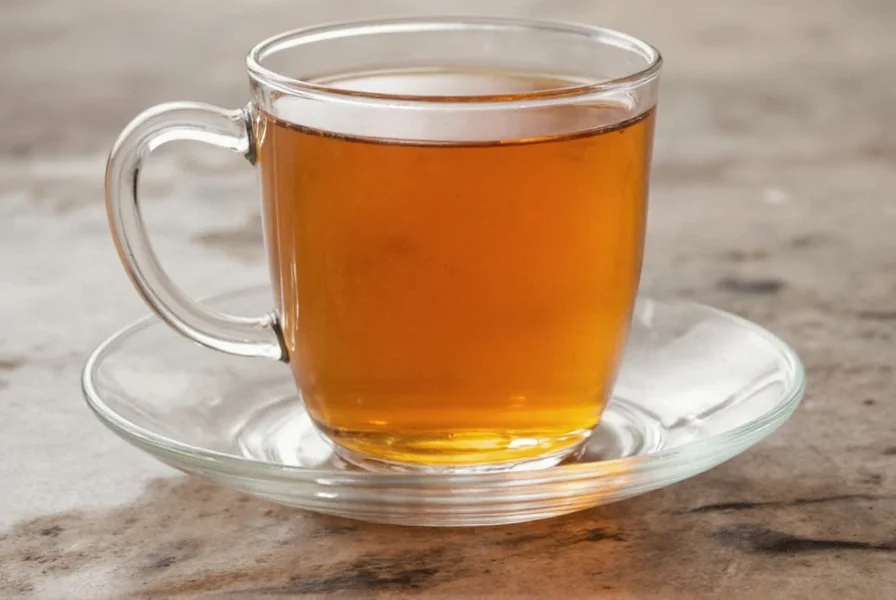Making ginger tea at home is simpler than most people realize. This ancient remedy has been used for centuries across Asian and Middle Eastern cultures for its soothing properties and distinctive spicy flavor. Whether you're seeking relief from nausea, a digestive aid after meals, or simply a comforting warm beverage, fresh ginger tea delivers both taste and wellness benefits without artificial ingredients.
Essential Ingredients for Perfect Ginger Tea
The beauty of ginger tea lies in its simplicity. You only need a few quality ingredients to create an authentic experience:
| Ingredient | Amount | Preparation Notes |
|---|---|---|
| Fresh ginger root | 1-2 inches | Choose firm, smooth-skinned ginger with no wrinkles |
| Water | 2 cups | Fresh spring water yields best flavor |
| Lemon (optional) | 1/2, sliced | Add after boiling for vitamin C boost |
| Honey (optional) | 1-2 tsp | Add after cooling slightly to preserve benefits |
Equipment You'll Need
Specialized equipment isn't necessary, but these basic kitchen items will help:
- Small saucepan with lid
- Vegetable peeler or spoon
- Sharp knife and cutting board
- Fine mesh strainer
- Mug for serving
Step-by-Step Ginger Tea Preparation
Follow these precise steps for the best ginger tea experience:
- Prepare the ginger: Peel the ginger using a spoon (scraping the skin off) or vegetable peeler. Thinly slice or mince 1-2 inches of ginger root.
- Boil water: Add 2 cups of fresh water to a small saucepan and bring to a rolling boil.
- Add ginger: Reduce heat to medium-low and add the prepared ginger. Cover with lid.
- Simmer: Allow to simmer for 10-15 minutes. Longer simmering creates stronger, more pungent tea.
- Strain: Pour through a fine mesh strainer into your mug to remove ginger pieces.
- Enhance (optional): Add 1-2 teaspoons of honey and a squeeze of fresh lemon juice.
- Serve: Enjoy while warm for maximum benefits and flavor.
Perfecting Your Ginger Tea: Pro Tips
Master the art of ginger tea preparation with these professional insights:
- Adjust strength: For milder tea, simmer 5-7 minutes; for stronger medicinal tea, simmer 15-20 minutes
- Freshness matters: Use ginger within 2 weeks of purchase for optimal flavor and potency
- Cutting technique: Thin slices release flavor more gradually than grated ginger, which creates a more intense brew
- Temperature control: Never add honey to boiling liquid as it destroys beneficial enzymes—wait until tea cools to 140°F (60°C)
Popular Ginger Tea Variations
Once you've mastered the basic preparation, experiment with these delicious variations:
- Ginger-lemon detox tea: Add 3-4 lemon slices during the last 5 minutes of simmering
- Spiced ginger chai: Include 1 cinnamon stick, 2 cardamom pods, and 3 whole cloves during simmering
- Cold-brew ginger tea: Steep sliced ginger in cold water for 12-24 hours in the refrigerator for a smoother flavor
- Ginger-turmeric immunity booster: Add 1/2 teaspoon turmeric powder and a pinch of black pepper during simmering
Troubleshooting Common Ginger Tea Issues
Resolve these frequent preparation problems:
- Too weak: Increase ginger quantity or extend simmering time. Fresh ginger loses potency when stored, so older ginger may require more volume.
- Too strong/bitter: Dilute with hot water or add honey/lemon to balance. Over-simmering (beyond 20 minutes) often causes bitterness.
- Muddy appearance: Use a finer strainer or cheesecloth to filter out small particles.
- Lack of aroma: Ensure you're using fresh ginger root, not dried powder, for authentic fragrance.
Storage and Shelf Life
Properly store your ginger tea for later enjoyment:
- Refrigerate brewed tea in airtight container for up to 3 days
- Freeze in ice cube trays for convenient single servings (thaw when needed)
- Store fresh ginger root in paper bag in refrigerator crisper drawer for 2-3 weeks
- Peel and submerge ginger in sherry or vodka to preserve for months
Frequently Asked Questions
How long should I boil ginger for tea?
Simmer sliced ginger for 10-15 minutes for optimal flavor extraction. Five minutes creates a mild tea suitable for beginners, while 15-20 minutes yields a stronger, more medicinal brew. Avoid boiling longer than 20 minutes as it can develop bitter compounds.
Can I make ginger tea without fresh ginger root?
While fresh ginger root produces the best flavor and maximum health benefits, you can substitute with 1 teaspoon of ground ginger per cup of water. However, the taste will be less vibrant and the therapeutic compounds less potent. Dried ginger requires longer steeping—simmer for 15-20 minutes to extract full flavor.
When is the best time to drink ginger tea?
Ginger tea can be enjoyed at any time, but specific timing enhances certain benefits. Drink 20 minutes before meals to aid digestion, before travel to prevent motion sickness, or in the evening to promote relaxation. Avoid drinking large quantities late at night as the slight caffeine content in ginger may interfere with sleep for sensitive individuals.
How much ginger tea should I drink daily?
Most health organizations recommend 3-4 cups of ginger tea daily as a safe amount for adults. Each cup should contain 1-2 inches of fresh ginger. Exceeding 4 grams of ginger daily may cause heartburn or digestive discomfort in some individuals. Pregnant women should consult their healthcare provider, with most recommending no more than 1 gram daily.
Does ginger tea help with nausea and digestion?
Yes, numerous studies confirm ginger's effectiveness for nausea relief and digestive support. The active compounds gingerols and shogaols accelerate gastric emptying and reduce inflammation in the digestive tract. For best results, drink freshly brewed ginger tea 20 minutes before meals or when experiencing nausea. The warming effect also helps relax intestinal muscles and reduce cramping.











 浙公网安备
33010002000092号
浙公网安备
33010002000092号 浙B2-20120091-4
浙B2-20120091-4